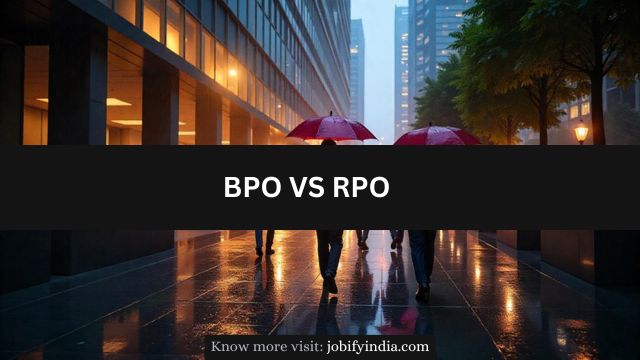In today’s fast-paced business world, companies are constantly looking for smarter ways to manage operations and grow efficiently. Two strategies that have gained popularity over the years are Business Process Outsourcing (BPO) and Recruitment Process Outsourcing (RPO). While both involve outsourcing certain tasks, they serve different purposes and impact businesses in unique ways.
If you’ve ever found yourself wondering, “What’s the real difference between BPO and RPO?”—you’re in the right place. This blog will break it all down in plain language, help you understand their roles, and explore how each can benefit your business in 2025 and beyond.
What Is BPO?
BPO stands for Business Process Outsourcing. This simply means a company hires a third-party service provider to handle specific business operations. These operations can be in areas like customer service, IT support, data entry, accounting, or even payroll.
Think of it like this: instead of doing every task in-house, a business lets experts handle certain parts of the work—so the company can focus on what it does best.
Common Types of BPO Services
- Customer Support: Call centers, chat support, and email assistance.
- Finance and Accounting: Bookkeeping, invoicing, and tax processing.
- IT Services: Network management, data storage, and software development.
Why Companies Choose BPO
Companies turn to BPO to:
- Reduce operational costs
- Improve efficiency and service quality
- Access specialized skills without hiring in-house
Let’s say you’re a small business owner. You might love building your product but dread handling customer complaints or balancing the books. That’s where BPO can step in, making your life easier and your business run smoother.
What Is RPO?
RPO stands for Recruitment Process Outsourcing. It’s a type of outsourcing—but it focuses specifically on hiring. When a company uses RPO, they outsource their recruitment efforts to a third-party provider who acts like an extension of their HR department.
In simple terms, RPO helps companies find and hire the right people, faster and more efficiently.
Services Typically Included in RPO
- Job postings and advertising
- Resume screening and shortlisting
- Interview scheduling and coordination
- Onboarding new hires
RPO providers use the latest tools—including AI technologies, data analytics, and automation—to source the best talent, which is especially valuable in competitive job markets. According to a 2023 LinkedIn survey, 70% of companies are now leveraging outsourced recruiting services to meet tight hiring deadlines.
BPO vs RPO: Key Differene
So, how do BPO and RPO really differ? Let’s explore some important contrasts:
👉 Before we dive into the detailed breakdown, here’s a quick comparison table to give you a high-level view:
🔍 BPO vs RPO: At a Glance
| Feature | BPO (Business Process Outsourcing) | RPO (Recruitment Process Outsourcing) |
|---|---|---|
| Primary Focus | Business operations (IT, customer service, finance, etc.) | Hiring and recruitment processes |
| Scope | Broad – can include multiple departments | Specific to talent acquisition and onboarding |
| Goal | Improve efficiency and reduce operational costs | Attract top talent and streamline hiring |
| Technology Used | Workflow automation tools, CRM systems, AI | ATS (Applicant Tracking System), AI-based sourcing tools |
| Business Impact | Enhances support functions and operational workflow | Improves recruitment quality and reduces hiring time |
| Delivery Model | Often fully managed or project-based | Often embedded within existing HR teams |
| Best For | Companies needing help with non-core functions | Companies scaling teams or with high-volume hiring needs |
👉 Now, let’s break point down in more detail:
1. Area of Focus
- BPO: Covers a wide range of business functions (IT, finance, customer service).
- RPO: Specifically focuses on recruitment and hiring processes.
2. Outsourcing Scope
- BPO: Can be partial or full outsourcing of an entire process or department.
- RPO: Often acts as a partnership, embedding recruiters within the client’s HR team.
3. Business Impact
- BPO: Helps streamline tasks that are non-core yet essential.
- RPO: Directly influences talent acquisition and workforce quality.
4. Tools and Technology
- BPO: Focuses on workflow tools, CRM software, and automation platforms.
- RPO: Leverages applicant tracking systems (ATS), AI recruitment tools, and data insights.
Recent Trends in BPO and RPO (2025 Update)
As we move further into 2025, both industries are evolving quickly. Here are some current trends you should know:
BPO Trends
- AI and Machine Learning are now used to automate repetitive tasks, freeing up human workers for complex roles.
- Remote Workforce Models have made outsourcing more flexible and globally accessible.
- CX (Customer Experience) Focus: BPO providers are now going beyond cost-saving—delivering better customer interactions is the new gold standard.
RPO Trends
- Talent Intelligence: Companies are using data to predict hiring needs and identify top performers.
- Diversity Hiring: RPOs are helping businesses build more inclusive workplaces by tapping into broader talent pools.
- Hybrid Recruitment Models: A mix of in-house and outsourced recruiting is on the rise for flexibility and cost control.
Which One Should You Choose: BPO or RPO?
It really depends on what your business needs right now.
If your company is struggling to handle day-to-day operations like processing invoices, running a call center, or managing IT support, then BPO is your best bet. It takes those responsibilities off your shoulders, so your team can concentrate on growth and innovation.
On the other hand, if you’re expanding or facing high employee turnover, and you need to bring in top talent quickly, then RPO is the way to go. It helps you find qualified candidates faster, improves the quality of hires, and can even reduce recruitment costs over time.
Need a clearer picture? Here’s a quick analogy:
Imagine your company as a car. BPO is like hiring a mechanic to fix non-engine parts like your brakes or AC—important tasks, but not the main driver. RPO is like hiring a driver who knows the road map well and helps you steer your car in the right direction (aka, hiring the right people).
Final Thoughts
BPO and RPO are both powerful strategies for modern businesses. They may sound similar—they both involve outsourcing work—but their purposes are quite different. BPO helps manage business operations; RPO helps fuel company growth by hiring the right people.
As more businesses adjust to the digital era, it’s no wonder BPO and RPO are evolving to offer greater flexibility, automation, and results. According to Grand View Research, the global BPO market is expected to hit $525.2 billion by 2030, while the RPO market is on track to grow at over 18% annually through 2028.
Whichever path your company takes—be it BPO, RPO, or both—understanding their differences helps you make smarter, future-ready business decisions.
Have you used BPO or RPO services before? Which one made the biggest impact on your business? Let us know in the comments below!




